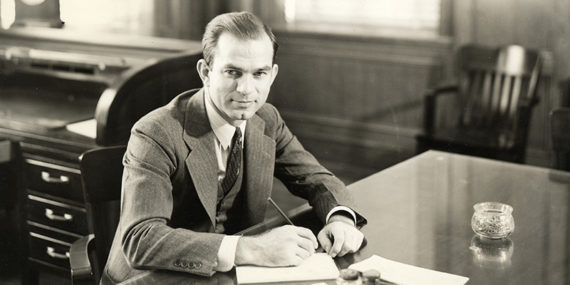J. William Fulbright, The Arrogance of Power, 1966 and The Price of Empire, 1967
Robert C. Byrd, Losing America: Confronting a Reckless and Arrogant Presidency, 2004
Known and celebrated as a “liberal” during the Vietnam War era, Fulbright was actually a quite independent-minded public figure. In some respects he represented a remnant of the Southern Democratic Jeffersonian tradition, and he was never anti-South. It is said that John F. Kennedy wanted Fulbright for Secretary of State but declined to nominate him because of massive criticism of his pro-South views.
James William Fulbright (1905-1995) was Senator from Arkansas 1945—1975, losing his 30-year seat because of opposition to the Vietnam War. Liberals celebrated Fulbright for that opposition, without realising that, while they opposed the war because it was anti-Communist, he opposed it because of the dread of the damage done to America by commitment to a military empire. Fulbright wrote that setting out to police the world and rescue mankind avoided dealing with internal problems and destroyed our hallowed tradition of inspiring by example.
A similar position was taken by another representative of the last Southern Democrat power in national affairs. Robert C. Byrd of West Virginia, Senator 1959-2010, questioned the wisdom of the Vietnam War. He vigourously opposed the U.S. expedition into Iraq, as indicated in his speeches and his 2004 book Losing America: Confronting a Reckless and Arrogant Presidency. Alas, by the time Byrd wrote, anti-war had become a leftwing syndrome and Southern politics had been absorbed by party-first empty suit Republicans.
Southerners have the reputation of supporting U.S. wars. We value honourable self-defense and effective replies to real enemies, and are the first to volunteer to go into harm’s way. But we have never thought that war was a noble crusade to spread democracy, which is always the national default excuse for American aggression. I remember with shame how many of us were foolishly led into supporting the Vietnam War. The antiwar movement was so arrogant and unpatriotic that it seemed natural to support the war. We should have thought further. We had become too much American and too little Southern.
There is a substantial tradition of Southern opposition to unwise imperial wars. Randolph of Roanoke spoke against the War of 1812. John C. Calhoun questioned the way that the Mexican War came about. President Polk had brought on war from a border incident so that Congress had little choice but to accept it. This was a terrible precedent, Calhoun accurately predicted. Calhoun sacrificed a good deal of popularity by insisting on limited war aims and warning that American liberty could not survive a plunge into imperial rule of other peoples.
Populists like Tom Watson of Georgia opposed the Spanish-American War, the annexation of Hawaii and other U.S. imperial ventures. President Cleveland sent a Georgia Congressman and former Confederate officer to try to counter the Republican-supported illegal takeover of Hawaii by New England profiteers and pseudo-moralists.
Perhaps the most sterling example of Southern opposition to war is given by Claude Kitchin. Kitchin served in the U.S. House representing the Old Republican Nathaniel Macon’s home district in North Carolina. He sacrificed his leadership position in the House by opposing Woodrow Wilson’s maneuvers to get America involved in the European bloodbath of World War I. Other anti-war people praised him as the strongest fighter in their cause. (See the article by Richard Gamble in the new Exploring the Southern Tradition collection published by the Abbeville Institute.)
While others celebrated the glory of an aggressive U.S. and its supposed righteous mission in the world, these Southern critics were concerned with the effects on American republicanism and the Constitution of the drive for world power. It was a remnant of Jeffersonian sentiment, a sentiment of people for whom America was a people and not a theory. Despite all the imitative pro-war hoopla by those Southerners who want to be good “Americans,” a remnant on the old Jeffersonian tradition survives and may even be ready for a comeback.







